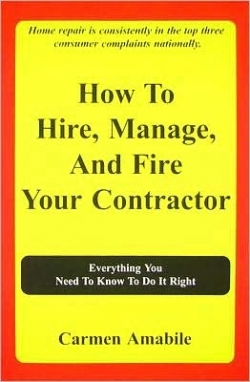
How To Hire, Manage, And Fire Your Contractor
Everything You Need To Know To Do It Right
Few enterprises require as much vigilance on the part of the consumer as hiring a contractor. Whether repairing a leaky roof or remodeling the whole house, “When that time comes,” author Amabile writes, “you had best be prepared to do battle.” Amabile, a licensed residential maintenance and repair contractor, has been on the front lines of the industry for nearly three decades. In this handy consumer guide, he turns that experience into practical advice for homeowners.
Amabile’s underlying theme is that it pays to do the necessary homework. In the building industries, he says, fraud is rife. For example, it’s not enough to ask if the contractor is insured. A “yes” could mean only that he has personal health insurance. Some contractors, he says, buy an insurance policy, then cancel it after they get the paperwork. The author gives clear instructions about who to call and what to ask to avoid falling victim to these scams. And, in the almost inevitable disputes of the homeowner-laborer relationship, it’s not always the contractor who is at fault. Homeowners’ games are all too familiar to contractors, the author writes, from husbands and wives who play good cop-bad cop, to failing to make prescheduled payments on time, to attempting to pit workers against the foreman. Several appendices list extensive resources where consumers can find established industry standards for various trades, licensing information, downloadable consumer contract forms, and checklists to use at various stages.
Lest the reader be tempted to think that the recommendations in this guide are too exacting, Amabile includes some sobering statistics about the nature of small contracting businesses serving the residential market. “Estimates suggest that up to 50% of the available labor force has an alcohol or drug abuse problem,” he writes. “Ex-convicts learn the trades in the prison system, and the government often provides employers with tax credits of up to 35% of their first year’s wages if the company hires former inmates.”
In such an environment, there’s no such thing as being too careful. Following the suggestions in this book is a good way to start.
Reviewed by
Marilyn Bowden
Disclosure: This article is not an endorsement, but a review. The publisher of this book provided free copies of the book to have their book reviewed by a professional reviewer. No fee was paid by the publisher for this review. Foreword Reviews only recommends books that we love. Foreword Magazine, Inc. is disclosing this in accordance with the Federal Trade Commission’s 16 CFR, Part 255.
